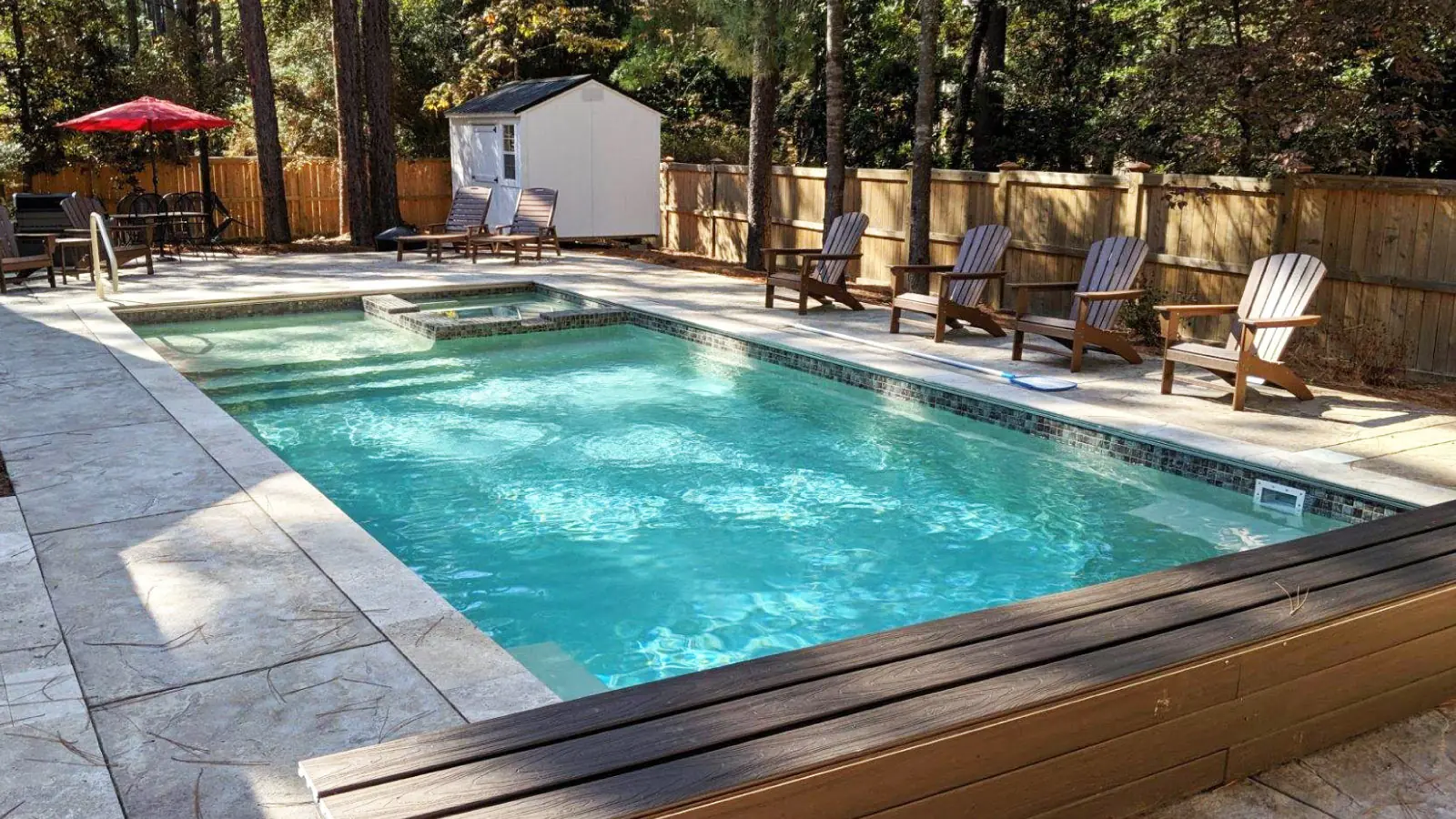
Pool Maintenance Made Easy
Introduction
Did you know that poor pool maintenance can cut your pool’s lifespan in half? A neglected pool can quickly turn from a sparkling oasis to a cloudy, algae-filled headache. But maintaining a pool doesn’t have to be complicated or time-consuming.
Think of your pool like your car—it requires regular attention, but once you establish a routine, it becomes second nature. Many homeowners assume that pool care is an overwhelming chore, but with the right approach, you can keep your pool in pristine condition with minimal effort.
In this guide, we’ll break down everything you need to know about pool maintenance, from daily upkeep to seasonal care, so you can enjoy a clean and inviting pool all year long.
Why Fiberglass Pools Are Low Maintenance
Not all pools require the same level of upkeep. If you’re looking for a low-maintenance option, fiberglass pools are an excellent choice. Here’s why:
- Durability: Unlike vinyl or concrete pools, fiberglass pools are resistant to cracks and wear, reducing the need for frequent repairs.
- Smooth Surface: The non-porous surface of fiberglass prevents algae from clinging and growing, meaning less scrubbing and fewer chemical treatments.
- Lower Chemical Use: Fiberglass pools require fewer chemicals to maintain proper water balance, saving you time and money.
If you already own a fiberglass pool, you’re ahead of the game. But regardless of your pool type, following a simple maintenance routine can keep your water clear and inviting.
Daily Pool Maintenance Tips
A little daily attention goes a long way in preventing bigger maintenance issues. Here are three quick tasks to keep your pool in top shape:
- Skimming Debris: Remove leaves, bugs, and other floating debris using a skimmer net. This prevents buildup and keeps your water looking pristine.
- Checking Water Levels: Ensure your pool’s water level stays consistent. Too low, and your pump could run dry; too high, and your skimmer won’t work effectively.
- Running the Pump: Circulate the water for at least eight hours a day to keep it clean and prevent stagnation.
These simple steps take just a few minutes but make a significant impact on your pool’s overall health.
Weekly Pool Maintenance
In addition to daily tasks, a weekly maintenance routine helps prevent long-term issues:
- Testing Water Chemistry: Use a test kit to check pH, chlorine, and alkalinity levels, making adjustments as needed.
- Brushing and Vacuuming: Algae and dirt can settle on pool walls and floors. Brush the walls and vacuum the pool to remove any buildup.
- Cleaning Skimmer and Pump Baskets: Empty out any trapped debris to ensure proper water circulation and filtration.
Keeping up with these tasks prevents cloudy water, algae growth, and filtration problems.
Monthly Pool Maintenance
Once a month, take a deeper dive into your pool’s health with these maintenance steps:
- Deep Cleaning: Use a pool shock treatment to eliminate bacteria and contaminants, especially after heavy use.
- Inspecting Equipment: Check your pump, filter, and heater for any signs of wear or malfunction. Catching issues early can prevent costly repairs.
- Detailed Water Testing: Test for calcium hardness and stabilizer levels. Proper balance prevents scaling, corrosion, and cloudy water.
By dedicating time each month to these tasks, you’ll keep your pool running efficiently and extend its lifespan.
Seasonal Pool Care
Each season brings different challenges for pool maintenance. Here’s what you need to know:
Spring
- Remove the pool cover and clear any accumulated debris.
- Balance the water chemistry before opening the pool for the season.
Summer
- Increase filtration time to accommodate frequent use.
- Monitor chlorine levels closely to prevent algae blooms.
Fall
- Reduce pump run time as temperatures drop.
- Skim leaves frequently to prevent clogging the filter.
Winter
- Winterize the pool by lowering the water level and adding antifreeze if necessary.
- Cover the pool to protect it from debris and harsh weather.
Adjusting your maintenance routine based on the season helps prevent common pool issues and keeps your water crystal clear year-round.
Troubleshooting Common Pool Problems
Even with regular maintenance, you may encounter occasional pool issues. Here’s how to fix them:
- Cloudy Water: This is often caused by poor filtration or imbalanced chemicals. Test your water and adjust chlorine, pH, and alkalinity levels accordingly.
- Algae Growth: Brush affected areas, shock the pool, and run the filter continuously for 24 hours to clear up the problem.
- Stains on Pool Surfaces: Identify the stain type—organic, metal, or chemical—and use the appropriate treatment to remove it.
Addressing these issues promptly prevents them from becoming major headaches.
Tools for Easy Maintenance
The right tools can make pool care effortless. Consider investing in:
- Robotic Pool Cleaners: These automate vacuuming and scrubbing, saving you time.
- Test Kits and Strips: Regular testing ensures balanced water chemistry.
- Pool Covers: These reduce debris accumulation and evaporation, making maintenance easier.
Using these tools simplifies upkeep and enhances the overall swimming experience.
Energy-Efficient Maintenance
Want to keep your pool clean while reducing energy costs? Here’s how:
- Use a Variable-Speed Pump: These pumps consume less energy while maintaining proper circulation.
- Solar Covers: Reduce heat loss and minimize chemical usage by keeping water temperature stable.
- LED Pool Lights: Energy-efficient lighting enhances nighttime swimming while cutting electricity costs.
Small upgrades like these can lead to significant savings over time.
Professional Maintenance Services
Sometimes, it’s best to leave pool maintenance to the experts. Here’s when to call in a professional:
- If your equipment malfunctions or needs repairs.
- If persistent water quality issues arise despite your efforts.
- If your pool requires deep cleaning or specialized treatments.
Hiring a professional service saves time, extends your pool’s lifespan, and ensures proper chemical balance. When choosing a pool service, look for certified professionals with positive customer reviews to ensure quality care.
Maintaining Pool Surroundings
A clean pool isn’t just about the water—it’s also about the area around it. Don’t forget to:
- Clean the Pool Deck: Prevents dirt and debris from entering the pool.
- Trim Nearby Plants: Reduces leaf litter and minimizes organic contaminants.
- Properly Store Pool Equipment: Keeps tools and chemicals organized and safe.
A well-maintained pool area enhances the overall experience and reduces the risk of additional maintenance issues.
Conclusion
Pool maintenance doesn’t have to be complicated. By establishing a simple routine, you can keep your pool in top condition year-round with minimal effort.
With the right tools, techniques, and occasional professional assistance, maintaining a pool becomes a stress-free experience—allowing you to focus on what truly matters: enjoying your backyard oasis.
Whether you prefer DIY pool care or hiring a professional, consistency is key to a clean, sparkling pool. Contact us today to find out more.

